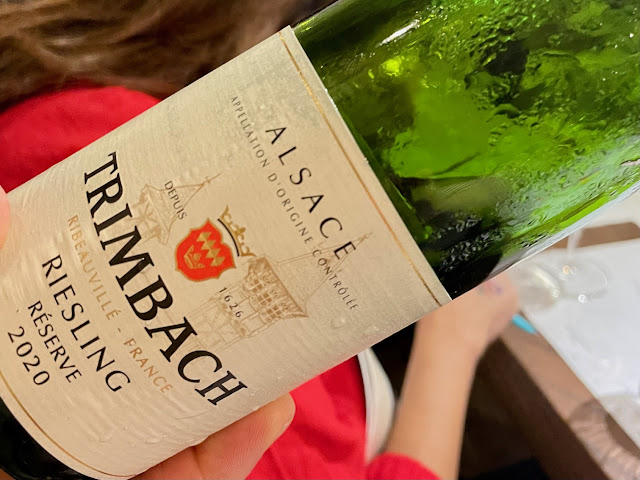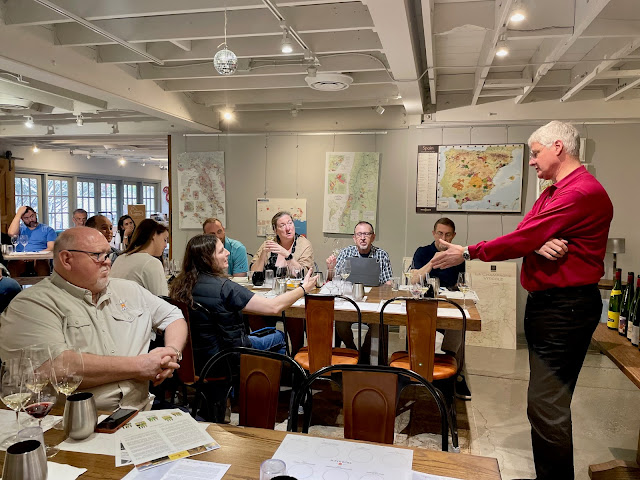 |
| Jean Trimbach at The Texas Wine School |
Originally established in 1626, the Trimbach family is now on their 13th generation of ownership in Alsace. Twelfth generation Jean Trimbach, who runs the winery Maison Trimbach with his brother Pierre, was in Houston last week to taste with local wine professionals in the Houston Sommelier Association at the Art of Cellaring/Texas Wine School.
Although, Trimbach is not the largest producer in Alsace, they produce under 100,000 cases a year, it has lead the region in cases sold to the United States since 1978. A very early adopter of sustainability, Maison Trimbach stopped all chemical use in both the vineyard and the winery in 1972. The Reserves, Gold label, Grand Crus, and Prestige wines are all produced organically. Forty percent of the Trimbach production is Riesling.
Jean Trimbach shared that the family vision for their wines has always been "purist". He stated that the Trimbach style is characterized as dry with no malolactic fermentation for the white wines and no new oak aging. It is important that the acidic tension be retained and the wines be balanced. They want to ensure that the wines are both ready to drink when released but should also have aging potential. All the wines are cellared before they are released from the 2-3 years for the Classic line on up to the 5-9 years for the Gold labels and Grand Crus. In Alsace, Grand Crus only represent 4% of the total production for the region but at Maison Trimbach, Grand Crus represent 30% of their total production.
 |
| The prestigious Trimbach "Frédéric Émile" 2014 Riesling is sourced from two Grand Crus. |
The vineyards are planted between the Vosges Mountain and the Black Forest on the Ribeauvillé faultline which fractured 50,000,000 years ago giving the region diverse terroir from complex calcareous limestone to biodegraded seashell fossils called "Muschelkalk". This area consistently cools down at night, Jean Trimbach stated that even when days hit 100 degrees in the summer, sweaters are still needed in the evening by 8pm. The Trimbach family currently owns over 123 acres of AOP classified vineyards.
Jean Trimbach was quick to extoll his brother's skills alerting the room that Pierre Trimbach has been named one of the world's Top Ten White Winemakers by Decanter magazine. The wines have all received high scores from critics from Jancis Robinson to James Suckling. All the wines tasted at this event are highly recommended. Several wines from the Classic and Reserve lines are very affordable (approximately $20-25), easy to locate (seen at HEB and Whole Foods), and give great value for the price.
The Tasting
Trimbach Pinot Noir "Réserve" 2018 - Jean Trimbach describes this wine as falling "between Burgundy and Oregan Pinot Noir" in style. It is sourced from a vineyard with the same yields as Bourgogne Grand Cru (40 hectolitres per hectare). It is the only Trimbach wine that undergoes malolactic fermentation in tank before bottling after aging six months on the lees creating a fresh, dry, elegant medium + body wine with earthy and smoky notes through the long fruit filled finish. Pair with roasted poultry, charcuterie, or marinated meats.
Trimbach Pinot Gris "Réserve" 2017 - Sourced from older vineyards in the village of Ribeauvillé and the surrounding area, this wine is fermented in stainless steel tanks and concrete vats to complete dryness. Trimbach noted that this wine has good aging potential but it is also ready to drink and believes it pairs well with everything except beef. The label depicts the famous butcher's tower in Ribeauvillé. Fresh pear notes with good concentration, a full body and a slightly nutty finish.
Trimbach Riesling "Réserve" 2020 - Sourced from the Premier Cru Lieux-Dits vineyard which enjoys a long ripening season due to the protection of the Vosges Mountains, this wine showcases the complex soils of the terroir, a mix of granite, limestone, schist, and sandstone. Trimbach noted that this wine can age 15-20 years. Dry, crisp, fresh and mineral driven, this wine pairs well with white meat and any fish dish - fried, grilled, smoked or raw and it is also a good pairing for meals served with sauerkraut.
Trimbach Riesling "Sélection de Vielles Vignes" 2017 - This wine is sourced from top vineyard sites in Hunawihr like Muehlforst and Grand Cru Rosacker and is vinified to complete dryness before aging in bottle for several years. Full body, bone dry with a beautiful texture, fresh and mineral driven with notes of lemon and peach with hints of pine or balsam fir and a persistent finish, Trimbach exclaimed, "There is great energy in this wine."
Trimbach Riesling "Frédéric Émile" 2014 - Served from a magnum. Jean Trimbach shared that this wine is offered on the majority of Michelin three starred restaurants in France. It was first produced in 1967 to honor an ancestor. It is bottled early to preserve the freshness and then aged in bottle for several years before release. The grapes for this wine are sourced from two Grand Cru vineyards - Giesberg and Osterberg. Fresh, rich, elegant, and mineral driven with lemon zest and a persistent, racy finish. The Osterberg vineyard is known for contributing acidity, structural backbone and mineral tension while Giesberg gives richness, higher alcohol, and broader shoulders to the wine.
Trimbach Pinot Gris "Réserve Personelle" 2015 - This wine is only made in the best vintage from high quality plots in the Osterberg Grand Cru and the Wiebaum Vineyard in Ribeauvillé which receive primarily morning sun. Trimbach commented that he believed this wine has a 10+ year aging potential. He likes it with foie gras but recently had enjoyed it with a sea bass in a spicy sauce.
Trimbach Gewurztraminer "Classic" 2018 - This wine is aged for two years before release. Dry, spicy, and fruity, this rich wine has a floral rose nose with spicy cloves and a good balance of acidity to fruit flavors. Pair with spicy dishes and soft cheese, Muenster is the classic pairing.


Comments
Post a Comment
Thank you for reading Wine Life - Houston.